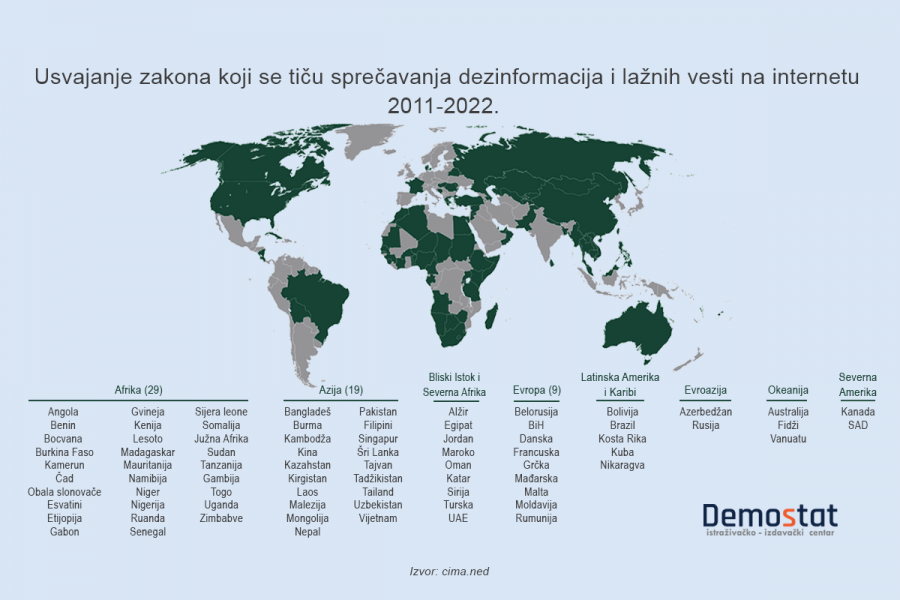Between 2011 and 2022, 78 countries adopted laws preventing the spread of fake news and misinformation online. Some of these laws focus on greater transparency of social networking platforms, establishing accountability for digital advertising, and increasing media and digital literacy. However, many legal solutions are often vague, allowing authorities to define prohibited content at their discretion and show tendencies toward repression. As a result, journalists risk heavy fines or even prison terms for any content that goes against the government line. In many countries, the suppression of false information is presented as a matter of national security, which in authoritarian states can pose a real threat to independent media.

Between 2011 and 2022, 78 countries adopted laws preventing the spread of fake news and misinformation online. Some of these laws focus on greater transparency of social networking platforms, establishing accountability for digital advertising, and increasing media and digital literacy. However, many legal solutions are often vague, allowing authorities to define prohibited content at their discretion and show tendencies toward repression. As a result, journalists risk heavy fines or even prison terms for any content that goes against the government line. In many countries, the suppression of false information is presented as a matter of national security, which in authoritarian states can pose a real threat to independent media.

All over the world, people are inundated with fake news, misleading information, and half-truths on matters of health, politics, science...
Journalists are on the front lines in this fight for the truth, trying to provide citizens with accurate news and information.
However, in the "post-truth" era, independent journalism faces enormous restrictions as governments pass laws to combat the spread of disinformation and "fake news," which both intentionally and unintentionally affect press freedom.
These measures can sometimes hinder the free and open exchange of ideas, as well as the ability of citizens to hold leaders accountable.
Since 2011, laws to prevent the spread of disinformation have been on the rise, with the highest recorded during the COVID-19 pandemic.
Between 2011 and 2015, 14 laws on preventing the spread of fake news were adopted, while in the period from 2016 to 2022, 91 such laws were adopted.
In 2020 alone, 36 new laws related to preventing the spread of disinformation were passed, indicating the increased concern of governments regarding the spread of news amid the COVID-19 pandemic.
Some of these laws focus on improving transparency and increasing media literacy.
However, many criminalize the creation and distribution of "fake news" and may have long-term consequences for press freedom and other human rights.
Many laws have already been used to arrest citizens and journalists for publishing or sharing false information online.
Although human rights activists and academic community members explain that anti-disinformation laws can limit freedom of expression, less attention has been paid to freedom of the press and the consequences of these laws for independent journalism worldwide.
An analysis of 105 international laws by the International Media Assistance Center identified four types of legal sanctions that could impede press freedom.
These are excessive fines for journalists or media organizations; prison, i.e., arrest and imprisonment of journalists and editors; content controls and corrections, as journalists and media organizations are required to remove content or publish state-approved corrections; and increased administrative burdens, which include measures such as licensing regimes, data localization, transparency requirements or authorized press or media advisories.
The Committee to Protect Journalists announced that nearly 400 journalists were imprisoned worldwide in 2022. Of those, 39, almost 10 percent, were in prison on charges under the Disinformation Act.
Of course, not all regulatory approaches have negative consequences, but specific policies can strengthen journalism in the digital era.
For example, laws that improve platform transparency and media literacy can help strengthen democratic processes and institutions.
However, many regulatory approaches to combating disinformation and fake news focus on criminalizing fake content, which can be problematic.
First, there are concerns about subjective interpretation and selective enforcement, which can be used to suppress dissenting or critical voices or independent journalism.
Second, it could lead to increased self-censorship as journalists fear reporting on issues that could land them in legal trouble.
However, as social media companies have seemingly failed to adequately respond to the challenges of spreading disinformation, governments are increasingly seeking regulatory intervention, which can set a dangerous precedent for autocratic leaders seeking to legitimize domestic censorship.
Freedom of the press is essential to democratic institutions, such as free and open debate and public accountability. Therefore, it is vital to consider how legislation may affect independent journalism.
Fines are the most commonly imposed penalties for disinformation, with varying levels of enforcement, targeting individuals, company executives, media organizations, or social media platforms.
For example, under a 2018 French law, an individual who engages in widespread and rapid disinformation could pay up to €75,000.
In Ethiopia, an individual can be fined up to $1,860 if they spread misinformation on social media and have over 5,000 followers.
For an independent news outlet, the punishment can be debilitating.
Malaysian publisher Malaysiakini has been fined approximately $124,000 over comments left by readers on one of its articles, which the courts found to be "false" and "untrue.”
Of course, it should be borne in mind that both liberal and less liberal states apply fines.
In February of this year, Russian journalist Maria Ponomarenko was sentenced to six years in prison for condemning the Russian armys air attack on the theater in Mariupol, Ukraine.
Her case is emblematic of a growing global trend as countries try to protect their news ecosystems from the flood of dangerous misinformation spreading online.
Independent journalists are often caught in the crosshairs of laws designed to combat disinformation and false information.
In Cambodia, a 2018 directive stipulated that an individual guilty of sharing false information could face up to two years in prison.
Similar to fines, the justification for prison sentences for individuals who spread what the government deems to be fake news or disinformation varies depending on the political environment or security concerns.
The Egyptian government jailed 19 journalists in 2018, the most arrests of journalists under disinformation laws of any country in the world.
After Egypt, Cameroon arrested four journalists, Rwanda three journalists, and China and Morocco each detained one.
In the same way that the number of laws enacted worldwide has been rapidly increasing, the number of journalists imprisoned based on those laws has steadily increased.
It should also be noted that imprisonment as a sanction for spreading disinformation is not limited to illiberal or authoritarian regimes.
Countries that rank high in democratic norms and processes have also adopted these laws.
In Denmark, for example, a 2019 amendment to the criminal code criminalized the dissemination of disinformation that "helps or enables" a foreign state actor to influence public opinion with a maximum penalty of 12 years in prison.
The third category of penalties is removing and correcting content, which involves forcing publishers, social media platforms, Internet service providers, or users to remove the offending content or publish a mandatory correction.
These fines and requirements include all media systems and are not limited to the Internet.
For example, under Egypts 2018 Law, the government can ban or suspend broadcasting if a media outlet spreads "fake news."
While content controls often focus on removing content, some countries have also introduced laws that force platforms to label content in a certain way.
For example, in 2022, Brazilian President Jair Bolsonaro signed a decree, now revoked, that temporarily banned social media platforms from removing specific types of content, including content that social media platforms identified as disinformation about COVID-19 and the upcoming presidential election in the country.
Administrative requirements include mandatory reporting requirements, licensing regimes, data localization, transparency requirements, or authorized press or media panels.
For example, Belarus amendments to media laws to address fake news require media organizations to register with the government and to identify the authors of posts and comments in online forums.
Although the bills proponents say it will "facilitate the effective provision of information, security and the enforcement of citizens constitutional right to receive complete, accurate and timely information," rights groups, including the Belarusian Association of Journalists, argue that it will simply act as another tool for censorship.
These administrative requirements can affect press freedom in ways that go beyond self-censorship.
They can erode privacy, as the Belarusian law above risks with identification requirements, or they can increase the states surveillance powers, such as Vietnams cybersecurity law, which requires foreign and domestic tech firms to set up offices and store data locally.
In all societies there are issues that are rather being skipped. Certain...
The neoliberal path, started in 2001, has led to especially bad results in Serbi...
For centuries, the region was subsumed within the Ottoman and Hungarian Empires,...
"Serbia has returned to the systemic and anti-systemic position of the political...
In reality, Serbia is closer than ever to NATO. In the course of the last five y...